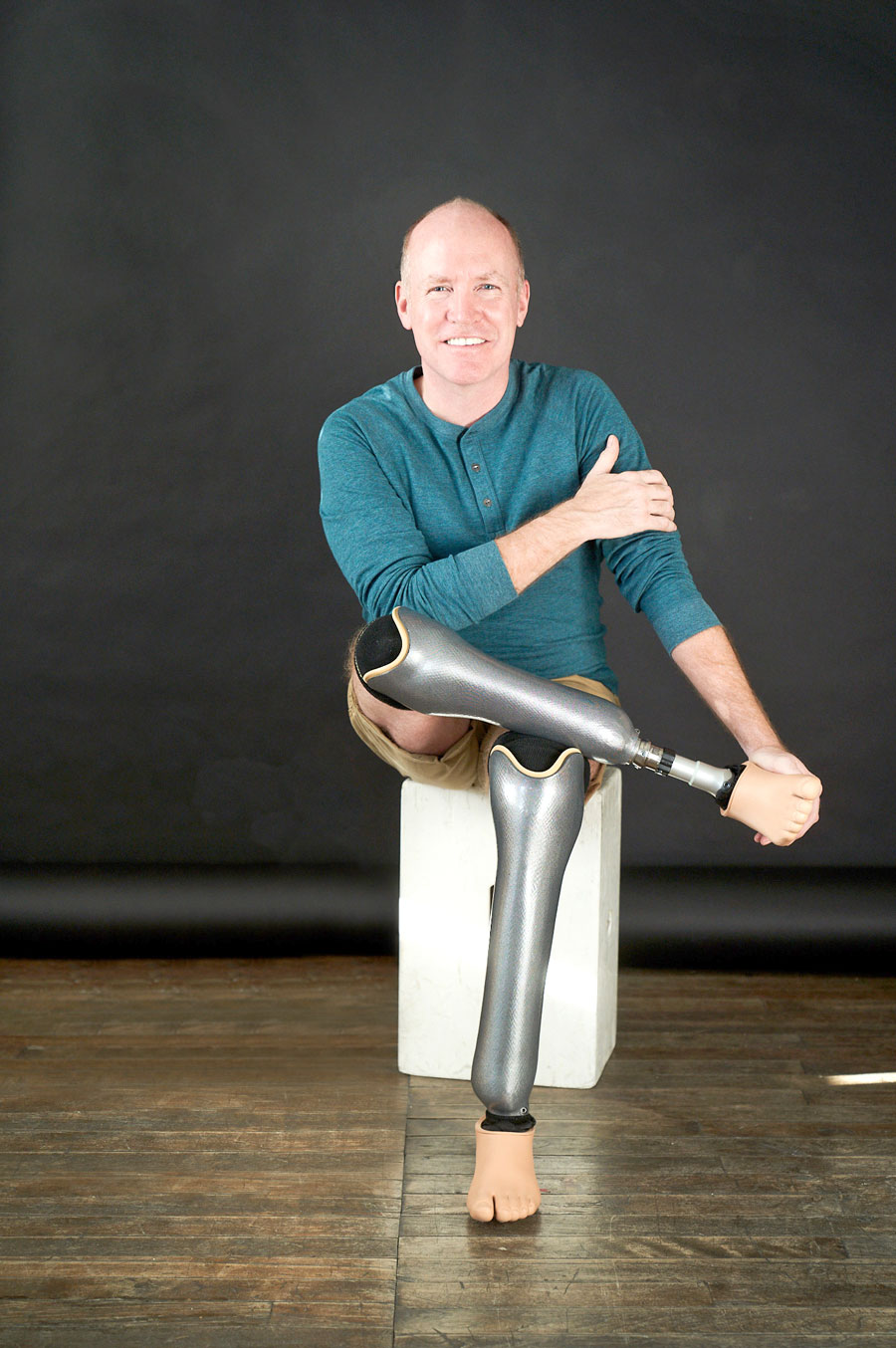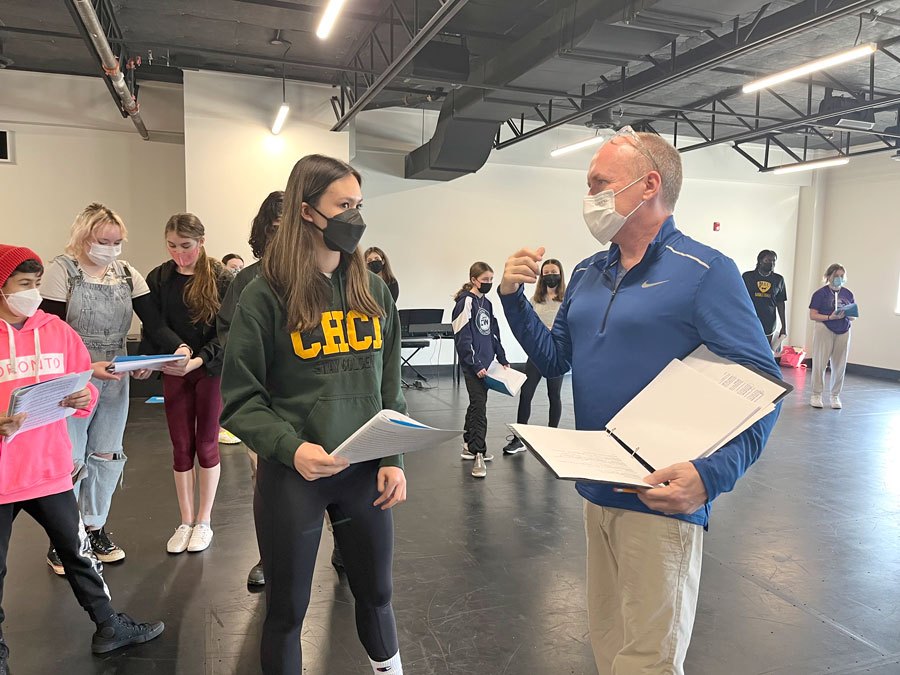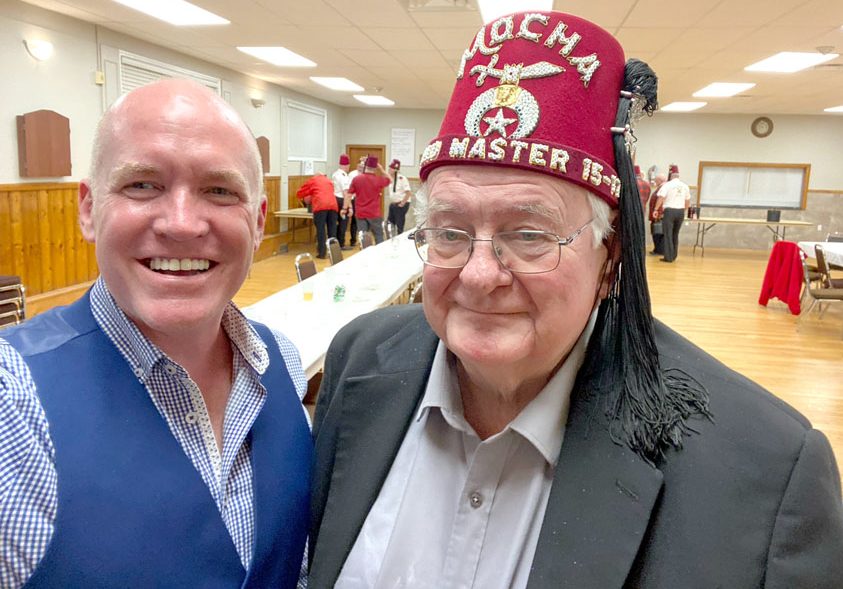CAMBRIDGE – David Connolly danced on Broadway to launch a professional career that has included performing around the globe and directing and choreographing shows for some of North America’s top theatrical companies and major television networks.
As his resume notes, he also happens to be a double below-knee amputee.
While you don’t need to know the latter fact to fully appreciate the remarkable career of the man who has been at the helm of over 30 Drayton Entertainment productions since joining the theatre company as associate artistic director and who currently leads their new Youth Academy, it transforms his story into the stuff of stage and screen.
“A congenital defect that was unexplained left me with lower limbs, below the knee, that had everyone in my family’s community say that I would spend the rest of my life in a wheelchair,” Connolly told the Advertiser in a May 18 telephone interview from Drayton Entertainment’s Hamilton Family Theatre in Cambridge.
“Everyone except my mother was pretty content with that diagnosis.
“But she knew that she was going to do her best to see if there were greater opportunities and searched the medical community,” first around David’s hometown of Sydney, Nova Scotia, then more broadly into the Halifax area, to no avail.
“This is 1967. So there wasn’t the benefit of any kind of online community or any of the technological advances that exist today. So she was turned away a lot,” Connolly explains.
Frustrated by the lack of options she found, Maureen Connolly was having her tank filled at a gas station, when the attendant, who could see she was visibly upset, asked if she was okay.
“She said ‘No, my son is not well,’ and he said ‘What’s wrong?’”
When she explained that her son was unable to walk, the man, who turned out to be the owner of the gas station, said, “My name is Fred. I’m a Shriner. I think we can help you.”
Their unexpected benefactor arranged for David and Maureen to go to Shriners Hospital for Children in Montreal, where doctors explained that, with a number of surgeries, it could be possible for David to walk.
However, doctors explained the hospital didn’t accept infants, only admitting toddlers at age three or four. David was just over six months old.
“My mother just knew, through I guess a mother’s instinct, that that was the place to be and so she said, ‘Well, I’m not leaving. So work it out,’ and kind of sat in the waiting room of this hospital,” said Connolly.
“And, again, the Shriners through, you know, Shriner magic, which isn’t really magic, but feels like magic, arranged to have the broom closet of that hospital converted into a nursery, the first-ever nursery.
“And a Shriner went to go buy a crib and they cleared out the buckets and the brooms and it became my home for … four and a half years.”
During that time, multiple extensive surgeries were performed.
“They amputated my right leg first and relocated my hips. And I didn’t really have a knee, so they had to craft a knee and do a bunch of bone grafts. And then, once the right side of my body kind of was taken care of, they went to work on the left side of my body, which they had hoped might develop into something that I could wear a brace on, but that wasn’t the case,” Connolly detailed.
“So then, when I was three or so, they amputated the left side, fitted me with artificial legs and then I flew home at five, I had just turned five, and walked off the plane and the rest is history.”
While there were many return trips from Sydney to Montreal for further surgeries and prosthetic replacements before the family moved to Ontario when David was nine, the Shriners support continued throughout.
“The Shriners facilitated and funded my going back and forth to the hospital, every time I needed more surgery or new legs to a total of, I think, 120 trips over time … because you outgrow artificial legs the way you outgrow shoes,” said Connolly.
“And so, there was a lot a lot of time in airports and a lot of time in the hospital. We didn’t pay a penny.”

Drayton Entertainment associate artistic director David Connolly addressed a gathering of about 50 Shriners and Masons at the Palmerston Legion on May 16. Submitted photo
After leaving Nova Scotia, Connolly says his care “kind of dovetailed into the Ontario system” and he also received assistance through the War Amps program.
“I became part of their child amputee program and they kind of they took over the funding. And my surgeries stopped …I didn’t need further surgery as of about 12.”
Connolly says it’s impossible to know what direction his life would have gone without the intervention of the Shriners.
However, he adds, “I wouldn’t have landed on Broadway, that much we know.”
Gifted with a talent for singing and a love of music, Connolly says “opportunities opened much wider” for him after moving to Ontario. He participated in high school musicals and joined a marching band.
“I was in a drum and bugle corps for five years. And that started to really fan the flames of a) my mother’s stress and b) my musical appreciation, because we were marching across football fields every summer for five years. But that is kind of what introduced me to choreography,” he recalls.
He also joined a group called “Project People,” which performed at fairs and festivals around the province. It was at one of those shows he was spotted by a professor from Sheridan College who encouraged him to attend that institution.
“It was a musical theatre program, and I was like ‘People study this? What’s there to know? You just sing and dance and make people happy.'”
During his last month at Sheridan, Connolly attended an audition in Toronto for a Broadway revival of the musical Shenandoah and got the part.
“Kind of a fairy tale – I finished school on a Friday and started rehearsal for the Broadway show on Monday,” he recalled.
With that, Connolly became the first, and to this day only, double amputee ever to perform on Broadway.
After the New York run of Shenandoah ended, Connolly stayed in the city and studied for a time, then landed a job on a cruise ship.
“It kind of came to the point where … okay, the next Broadway show wasn’t happening and you need money, go make money on the ship,” he explains.
“Up until that point, like nobody knew about my legs. It was all a secret. I never talked about it. Nobody ever talked. Nobody asked me. I didn’t tell them.
“There were some costume people that were in on, you know, the news, but other than that, the creative team didn’t know.”

Drayton Entertainment associate artistic director David Connolly. Photo by David Leyes
Following the cruise ship stint, Connolly landed a dancing role at the Stratford Festival.
As he transitioned from performing to the creative side of theatre, Connolly became involved in a wide range of unique projects.
He served as creative producer for Fashion Cares in support of the AIDS Committee of Toronto and has volunteered for the Jerry Lewis Muscular Dystrophy Telethon, Easter Seals, Project Angel Food and The Hincks-Dellcrest Centre for Children’s Mental Health.
He also served as the director of Pauletta Washington and Diane Louie’s United Nations Development Program concert, Chronicle, which toured North America, and culminated in a performance at the United Nations General Assembly Hall.
In addition, he directed and choreographed several series for CBC Kids as well as projects for CBS, NBC, ABC, PBS and two feature films.
In the course of his work, Connolly has collaborated with renowned artists such as Katy Perry, Andrew Lloyd Webber, Elton John, Sarah Jessica Parker, kd lang, Sarah Brightman and many others.
“People like Katy Perry and Sarah Brightman were through a gala fundraiser that I would do annually in Toronto called Fashion Cares. And they would come, headline and I’d choreograph for them and they would … premiere their material in Canada before it went to America.
“And so I choreographed their arena show versions of their premiere songs.”
Connolly added, “Andrew Lloyd Webber was through a television series called How Do You Solve a Problem Like Maria that I choreographed for CBC. And that was a contest to find the Maria for Sound of Music.. There’s all kinds of different intersections, but wonderful people.”
It was in 1999, while working for a Los Angeles production company as a choreographer and on high-profile projects like the Miss America pageant and the Jerry Lewis Telethon, that Connolly got a call from Drayton Entertainment artistic director Alex Mustakas inviting him to direct and choreograph a musical at the King’s Warf Theatre.
He worked intermittently with Drayton Entertainment in the following years until getting an offer from Mustakas to join the theatre company permanently.
“Seven years ago now is when he invited me to come on board full-time as his associate artistic director to start to build the school (Youth Academy). So that’s that journey.”
Admitting to some obvious bias, Connolly is a big fan of the way things are done at Drayton Entertainment.
“We operate seven stages in Ontario, in incredible communities that deserve to be entertained at a level that equals or surpasses any other theatre company in North America,” he said.
“So it’s our aim to entertain, affordably … be fiscally responsible about making theatre affordable. Not only the ticket price, but the whole experience.”
As associate director, Connolly has helmed over 30 productions, including such popular fare as Kinky Boots, Priscilla Queen of the Desert, Mama Mia! and Newsies. A reprise of Mama Mia! is set to be among his contributions to the 2022 season.

Heading up Drayton Entertainment’s fledgling Youth Academy is among the priorities for associate artistic director David Connolly. Submitted photo
However, much of his focus these days is on the developing Youth Academy program.
He notes Mustakas’ vision of expansion for the company isn’t about acquiring more theatres.
“He’s deeply committed to these communities that we’re in and identified that expansion means affecting the next generation and coming up with a plan to make sure that we … have roots into the families of the communities that are supporting us,” Connolly explained.
“Because we recognize, especially over the pandemic, this idea that the real change that needs to happen is going to come from the next generation.
“Our goal isn’t to be a star factory, although we know that many of our kids will go on to great careers and, selfishly, we’ll take advantage of that.”
However, Connolly notes, the focus is on benefitting “these kids who don’t feel like they belong anywhere else.
“Whatever they’re going to go on to be, they’ll have this toolbox that we give them.”
A passionate advocate for inclusion, Connolly says the artistic community has a long way to go to become truly representative.
“There is no disabled representation on stage or screen that anyone can point me to that has real value. There are some disabled characters in a handful of projects that are almost always related to the idea of pity or inspiration,” he said.
“There is not yet characters on stage or screen that people can look to, where the storyline has nothing to do with their disability, they just happen to navigate the world differently … So that’s the shift that needs to happen.”
Reflecting on the impact of the Shriners and their hospital on his own life, Connolly worries about the possibility of such service organizations “not repopulating” with new volunteers.
“The world has really shifted into different ideas, I guess, around what charity looks like, what philanthropy looks like,” he said.
Lauding the Shriners’ “commitment to service and children and running these hospitals at zero expense to the families that go,” Connolly said, “I hope that it continues to regenerate and I hope that younger people start to see the value of the fellowship and the point of that kind of selflessness.”
On May 16, Connolly shared his story with about 50 Shriners and Masons at gathering at the Palmerston Legion.
Among those on hand was Pal Mocha Shrine club president and Drayton Entertainment board of directors member John Green.
“I think, for many Shriners that were there that night, it builds pride and dignifies what you’re doing as a Shriner to provide funding for 23 hospitals in North America,” Green told the Advertiser.
“If you’re under 18 years old it costs absolutely nothing to be a patient there, for a doctor’s care, or overnight accommodations, or anything.”
Green added, “From a Shriner perspective, it’s quite rewarding to see somebody like David Connolly become a success in an industry that you wouldn’t suspect that he would normally be in.”
Green says Connolly “has a unique way of presenting himself that makes me feel very proud of not only what Shriners can do from a medical point of view, but the pride and dignity that builds in individuals that become a success like him.
“He’s an integral part of our new Youth Academy, which we hope will provide an opportunity for young people to get involved in theatre.”
Green continued, “We have all kinds of minor hockey teams and soccer teams and baseball teams – and now we have a minor Youth Academy for entertainment and performances.
“And he’s an integral part of that, because of the unique way that he presents himself, happy and very positive in what he’s doing and having lived through an experience that none of the rest of us have. I’m sure that adds to that perspective.”




